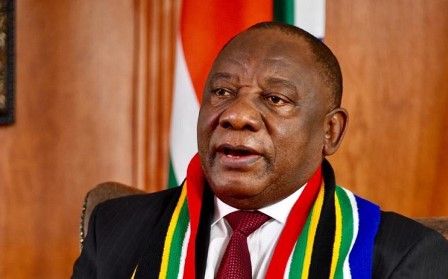
Ramaphosa’s emergency plan to end load shedding
South Africa’s National Energy Crisis Committee, a body run by the office of President Cyril Ramaphosa, expects record power outages to ease as measures put in place, including a new law to fast-track plant development, take effect.
The committee, of which several cabinet ministers are members, told business and labour leaders on Monday (16 January) that a range of interventions have been made at a time when South Africans was enduring blackouts of as much as 12 hours a day.
“As these measures take effect, the supply of electricity will significantly improve,” the committee, known as Necom, said in a presentation sent to Bloomberg by Ramaphosa’s office.
South Africa’s government has faced sharp criticism after power cuts were imposed on 205 days last year and every in 2023. Ramaphosa cancelled his trip to the World Economic Forum in Davos to hold crisis talks with power utility Eskom, labour groups and business.
The measures that Necom said may ease the crisis include:
- The first of more than 100 privately owned power plants being developed will connect to the grid by the end of this year. In total, the planned projects could produce 9,000 megawatts, much of it for the companies’ own use.
- Emergency legislation is being developed to allow the faster approval and development of power plants.
- Contracts for the construction of plants that will produce 2,800 megawatts of renewable energy for the grid have been signed and construction will soon begin.
- As much as 1,000 megawatts may be imported this year from neighbouring countries, and Eskom will buy 1,000 megawatts of excess energy from private producers who already have facilities.
- Six of Eskom’s 14 coal-fired power plants have been “identified for particular focus” in a bid to get them to perform more reliably.
- Efforts to finish incomplete plants and maintenance of other major units are being made.
- The time to complete regulatory processes for new plants has been reduced.
News Category
- International retailers
- On the move
- Awards and achievements
- Legislation
- Wine and liquor
- Africa
- Going green
- Supplier news
- Research tools
- Retailer trading results
- Supply chain
- Innovation and technology
- Economic factors
- Crime and security
- Store Openings
- Marketing and Promotions
- Social Responsibility
- Brand Press Office
Related Articles

Shoprite increases executive pay as consumers t...

Unions slam SA retailers for ‘profiteering’ as ...

Major Petrol Price Changes on the Horizon

Retailers not cutting food prices fast enough -...


